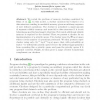Free Online Productivity Tools
i2Speak
i2Symbol
i2OCR
iTex2Img
iWeb2Print
iWeb2Shot
i2Type
iPdf2Split
iPdf2Merge
i2Bopomofo
i2Arabic
i2Style
i2Image
i2PDF
iLatex2Rtf
Sci2ools
122
click to vote
ICALP
2007
Springer
2007
Springer
Checking and Spot-Checking the Correctness of Priority Queues
We revisit the problem of memory checking considered by Blum et al. [3]. In this model, a checker monitors the behavior of a data structure residing in unreliable memory given an arbitrary sequence of user defined operations. The checker is permitted a small amount of separate reliable memory and must fail a data structure if it is not behaving as specified and pass it otherwise. How much additional reliable memory is required by the checker? First, we present a checker for an implementation of a priority queue. The checker uses O( √ n log n) space where n is the number of operations performed. We then present a spotchecker using only O( −1 log δ−1 log n) space, that, with probability at least 1−δ, will fail the priority queue if it is -far (defined appropriately) from operating like a priority queue and pass the priority queue if it operates correctly. Finally, we then prove a range of lower bounds that complement our checkers.
| Added | 08 Jun 2010 |
| Updated | 08 Jun 2010 |
| Type | Conference |
| Year | 2007 |
| Where | ICALP |
| Authors | Matthew Chu, Sampath Kannan, Andrew McGregor |
Comments (0)

